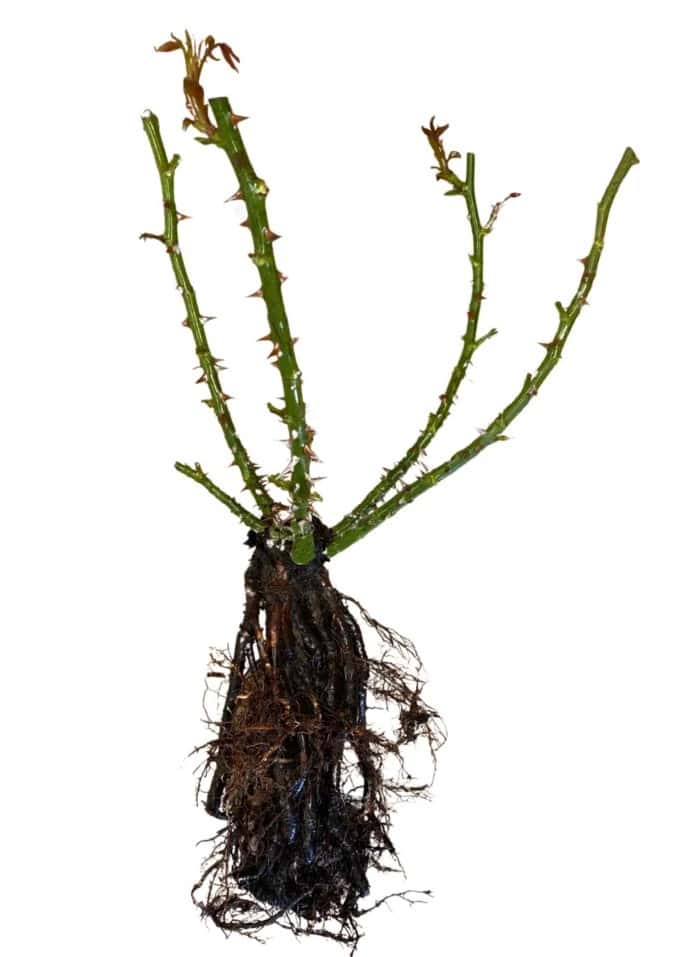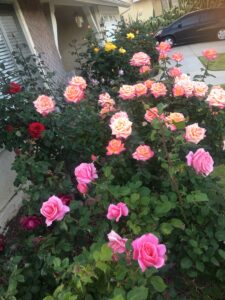
It’s that time again, time to prune my roses and select new bushes from the myriad of bareroot roses available this time of year. I’ve decided to add the new John-Paul II rose. A fragrant pure white rose with 5” blossoms. Bareroot roses are usually sold in January and February, which is their dormant season. They come packaged in plastic bags with their bare roots packed in sawdust. A healthy plant will have 3 or 4 bare canes protruding out of the bag. These ugly barren canes will eventually blossom and become a beautiful rosebush.
I remember when we first started our rose garden. We had lived in our home about 2 years and decided to tear out all the existing shrubs in the front yard and plant 12 bareroot roses. The whole family worked several days: digging holes, measuring fertilizer, opening bags, discarding sawdust and arranging the bare stocks. We attracted the attention of a neighbor boy, Chris. He sat and chatted with us each day. He was so curious about what we were doing. As we finished up that last day Chris said, “Can I ask you why you planted all these sticks in your yard?” It never occurred to me that Chris had never seen a bareroot rose being planted. He must have thought that we had lost our minds.
I began to explain how bareroot roses work. Chris’ young face revealed to me that he did not have enough life-experience to believe my “bareroot theory.” I encouraged him to watch the sticks over the next 5 months. I tried to support my “theory” by telling him I had planted sticks before and they do, in fact become roses by spring. As I reflected more on our conversation it struck me that faith is like planting bareroot roses. It is only with the knowledge of who God is and what he can do that we can faithfully carry on, looking for the eventual blossoms – even in the darkest, dormant seasons of our lives.
I remember one such period in my life, I’ve had many. It was early on in our marriage, my husband had an awful accident. The doctors didn’t think he would live, let alone walk or ever work again. During that time I struggled with suicidal thoughts and was prone to panic attacks. We lost everything in a matter of months – everything, our car, or home and our source of income, not to mention the toll it took on my young husband’s health. I took on a second job while he recovered. I rode a bicycle to and from work. Many times shopping at the market and somehow struggling home with milk and bread.
Throughout that year it was the faith of others that got me through. My parents mostly, they kept encouraging me, praying for me. I had never experienced the deep, deep feelings of isolation that engulfed me during those days, I was only 23. I wish I could tell you, I turned to God and I felt his presence along side me … I didn’t. I had no choice but trust those who knew God and knew that he was there – even though everywhere I looked there was little to no evidence of his presence or existence. What I experienced was just a small taste of the isolation that Christ felt in his last moments on the cross. His final words calling out, “My God, My God, why have You forsaken Me?” (Matt 27:46)
I’ve come to understand that faith isn’t a “program” just something to follow to make hardships disappear. No, faith is what keeps me connected to God. But faith, just like everything else that is important to us, takes work. It takes discipline, a commitment to things that will grow our faith. Things like regular prayer and Bible reading, seeking God’s direction in everything, being connected to a church that will keep you accountable, and surrounding yourself with people of faith.

Odd, but at difficult times, it’s my spiritual disciplines that I want to abandon first. The natural thought is “Well, this isn’t working. There’s something more that I should be doing.” But it is during those times that spiritual disciplines are most important. Faith isn’t the end; it is a means to an end. The End is a closer relationship with God. Faith is what allows us rely on him, to get through those dark times – and emerge on the other side stronger and better prepared for the next challenge that life brings. Christ called out to God in those last moments; did God deliver him from the cross? No – God permitted the pain and sorrow because he had something bigger in mind.
Although I never presume to know the mind of God, I have learned that I can trust him, trust that he has something bigger in mind for me. I look back at that dark time in our marriage and I can see that God was at work and present. It gives me assurance and I can rest in the knowledge that he is present, regardless of how things might appear or the isolation that I feel. Just like my rose garden, there may only be sticks this winter, but I know I will have roses in the spring.